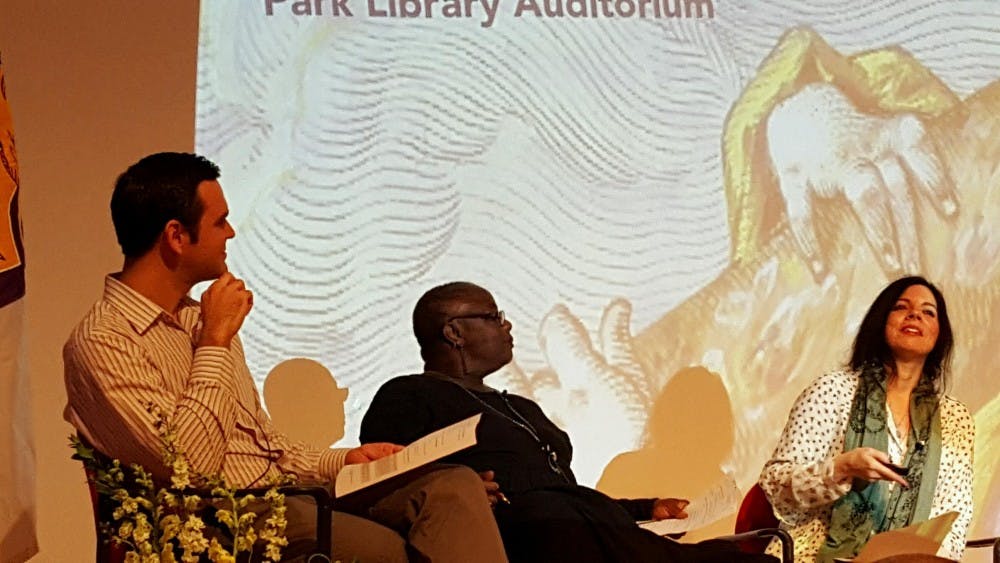Global Peace comes to CMU
Theory of human rights became practice for students during the Global Ethics, Gender and Militarism: A Conversation and Recovery of our Lost Memory conversation on Friday. The talk was part of "Global Ethics Day"-a day organized by the Carnegie Council for Ethics in International Affairs in New York. Over 50 institutions worldwide participated in this year's Global Ethics Day, including CMU.
Philosophy and Religion faculty Hope May and Andrew Blom, and English faculty Maureen Eke shared their experiences involving history, human rights, feminism and theory with students.
In April, the three attended a conference on global ethics, gender and militarism in The Hague, The Netherlands. This conference celebrated the 100th anniversary of an historic gathering of more than 1,100 women in 1915 who met in The Hague in attempt to find a peaceful resolution for World War I.
"We were in The Hague to celebrate and commemorate the huge things that were happening," May said.
Famed feminists Susan B. Anthony, Elizabeth Cady Stanton and Jane Addams were important players in the emerging peace movement at the turn of the century. Addams helped found the Women's International League for Peace and Freedom in 1919.
Addams would be the first American woman to win a Nobel Peace Prize in 1931.
"It's important to recognize that women were organized internationally before 1915," May said. "They organized in 1888 and it was the US who took the lead."
Philosophy and Religion faculty and head of the Center for Personal and Professional Ethics Hope May incorporated CMU's own history into discussion. May shared her findings regarding EC Warriner, CMU's fourth president and an outspoken peace activist at the beginning of the 20th century.
The group used Warriner's essays -a focus in May's studies- to frame patriotism as it relates to global ethics.
"What does it mean for somebody to be patriotic?" Blom said, offering Warriner's definition of the idea. "To be patriotic, to have that trait of character, is to be prepared for the defense of your country."
The three discussed the biases of Warriner's assumptions and suggested "true patriotism", which places humanity above the interests of any one nation.
"(True Patriotism) is something that trumps natural identity. If you see your country engaging in atrocities, you have a duty as a citizen of the universe to try to stop them," May said.
Eke spoke about peace activism in her home country of Nigeria, including the Women's War of 1929. The Women's War began as protest against the occupying British Colonial government at the time.
"The women marched on the British administration and sat in because they wanted action," Eke said. "They were not going to engage them with weaponry."
With this in mind, the Blom and May created their own peace pledge in April.
"As Part of the Women's Power to Stop the War Movement, I commit to:
Educate our corner of the universe about positive peace history-in the spirit of Jane Addams' definition of peace-which acknowledges the role of gender."
Students were given the option of creating their own peace pledge, which May will send to the Carnegie Council for Ethics in International Affairs, the convener or Global Ethics Day.
Tawas senior Kristin Murphy wrote a pledge reflecting her interests in international peace.
"I think that's something that is really important, it opened my eyes to the idea that there are multiple opportunities for working in that field," Murphy said.
May encourages students to get involved through the upcoming Human Rights, Literature, The Arts and Social Sciences International Conference on October 30 and other events which will comprise CMU's celebration of Human Rights Month in November.
There will be a follow-up discussion October 23 at 1-3pm in Anspach 258 to discuss the subject matter further.




